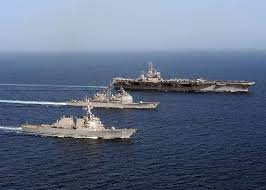Washington/Caracas/New Delhi – In a bold show of force, the United States has deployed three warships to the Caribbean Sea near Venezuela, escalating tensions in the region. The move, officially framed as part of a broader maritime security operation, is widely interpreted as a warning to the Maduro regime and its allies, particularly Russia and China. But the ripple effects could reach as far as India.
Why the U.S. Is Flexing Muscle Near Venezuela
The deployment comes amid renewed unrest in Venezuela and growing concerns about foreign military and economic influence in the region. Venezuela’s close ties with U.S. rivals, including arms deals with Russia and oil contracts with China, have drawn Washington’s ire.
American officials claim the operation aims to “curb transnational crime,” but analysts suggest it’s also a message: the U.S. is reasserting dominance in its own backyard.
India’s Stakes: Oil, Geopolitics, and Global Markets
India doesn’t have a direct stake in Venezuelan politics, but it does have something to lose — energy access and market stability.
- Oil Imports at Risk:
Venezuela, though under sanctions, has long been an alternative oil source for India. Any military escalation or tighter U.S. enforcement could further choke Venezuelan crude exports, shrinking global supply. This could drive up prices — a serious concern for India, which imports over 85% of its crude. - Geopolitical Tightrope:
India has tried to balance its relationships with both the U.S. and other global powers. A military standoff involving Russia, China, and the U.S. puts pressure on New Delhi to clarify its strategic alignment — a tough call in an election season and amid BRICS dynamics. - Currency Volatility and Trade:
Any escalation could rattle global markets, triggering oil price spikes and currency swings. That impacts India’s import bill, trade deficit, and inflation outlook. It also increases risk for Indian companies operating in Latin America or exposed to emerging market turbulence.
Bottom Line
While the U.S. warships are nowhere near Indian waters, the shockwaves could be felt in every Indian fuel pump, stock exchange, and foreign policy briefing. If tensions spiral, New Delhi may be forced to rethink its energy diversification strategy — and its diplomatic posture in a world sliding toward bipolar conflict.

